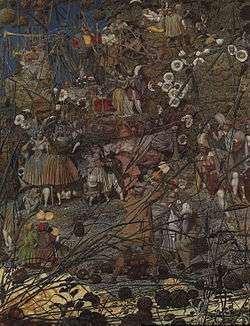The Fairy Feller's Master-Stroke

The Fairy Feller's Master-Stroke is a painting by English artist Richard Dadd. It was commissioned by George Henry Haydon, who was head steward at Bethlem Royal Hospital at the time. He was impressed by Dadd's artistic efforts and asked for a fairy painting of his own. Dadd worked on the painting for nine years, paying microscopic attention to detail and using a layering technique to produce 3D-like results. Although it is generally regarded as his most important work, Dadd himself considered the painting to be unfinished (the background of the lower left corner is only sketched in), and as such added the suffix of "Quasi" to its title.
In order to give context to his work, Dadd subsequently wrote a long poem by the name of Elimination of a Picture & its Subject—called The Fellers' Master Stroke in which each of the characters appearing in the picture is given a name and purpose—including myriad references to old English folklore and Shakespeare—in an apparent attempt to show that the painting's unique composition was not merely a product of random, wild inspiration.
The painting is in the Tate Britain collection. It was presented to the Tate by the war poet Siegfried Sassoon in memory of his friend and fellow officer Julian Dadd, a great-nephew of the artist, and of his two brothers who gave their lives in the First World War.
In other works
The Queen song "The Fairy Feller's Master-Stroke" from the album Queen II was born of Freddie Mercury's appreciation of the work; it makes direct reference to the painting's characters as detailed in Dadd's poem.
Terry Pratchett's novel The Wee Free Men contains a scene inspired by the painting.
The painting, the art of the insane, and Dadd are mentioned in the novel, Mortal Love, by Elizabeth Hand.
The work is a central plot element in the novel The Witches of Chiswick by Robert Rankin.
Neil Gaiman wrote a tribute to the painting for Intelligent Life (July/August 2013)[1]
The painting appears in Alex Bledsoe's Tufa novels.
The painting is an attributed plot element in Mike Shevdon's The Road to Bedlam, Book II of his The Courts of the Feyre series.
Former Gorky's Zygotic Mynci singer Euros Childs included an instrumental song titled 'The Fairy Feller's Master-Stroke' on his 2009 solo album, Son of Euro Child.
Mark Chadbourn's "The Fairy Feller's Master Stroke", about a contemporary young man looking for meanings in the painting, won the British Fantasy Award for best short story in 2003.
Octavio Paz devoted a chapter on Richard Dadd and this painting in particular in his book "The Monkey Grammarian".
References
- ↑ "Neil Gaiman's fantasy painting | 1843". Moreintelligentlife.com. 2013-06-14. Retrieved 2016-06-22.
Bibliography
- MacGregor, John. (1989). The Discovery of the Art of the Insane. Princeton University Press. ISBN 0-691-04071-0
- Tate online: Richard Dadd
- PopSubCulture(dot)Com Biography Project
External links
- Tate online: Richard Dadd's "The Fairy Feller's Master-Stroke"
- Google Art Project: "The Fairy Feller's Master-Stroke"
- Tate online: Sigmar Polke on Richard Dadd
- Excerpts of the poem in the context of Shakespeare from the English Department of Emory University
- s:Elimination of a picture and its subject - called the feller's master stroke printed text
